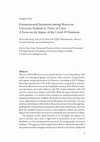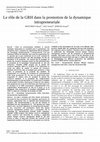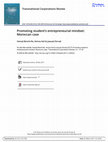Papers by Hanaa Benchrifa

Entrepreneurial responses to Covid 19 in Africa, 2022
The year 2020 will be forever associated with the COVID-19 pandemic. This health crisis disrupted... more The year 2020 will be forever associated with the COVID-19 pandemic. This health crisis disrupted global interactions with countries closing borders and regions being locked down.
In Morocco, according to HCP (Higher Planning Commission), 57% of all companies have stopped their activities. The most affected sectors are the hospitality industry with 89% of companies shut down, the textile industry with 76%, leather industries with 73% and the construction industry with 60%.
With the unprecedented nature of the pandemic, it is unclear what its impact on entrepreneurship and entrepreneurial intentions would be. Research has shown that crisis may have a two-edged impact on entrepreneurial intentions. On one hand, crisis may motivate individuals to defend their financial and social status through supporting their entrepreneurial intentions while on the other hand, crisis may limit the available financial resources and negatively impact the psychological and mental states necessary for entrepreneurial intentions to thrive.
The purpose of this study therefore is to investigate the impact of a socio-economic crisis (with a high level of uncertainty as COVID-19 pandemic) on the entrepreneurial intentions of young people (university students). The paper provides insights about drivers and barriers that affect the intentions of becoming an entrepreneur. Based on the theory of planned behavior and Social cognitive theory, we adopt a quantitative cross-sectional methodology using a survey of university students in Morocco which allows us to analyze whether the crisis had a positive or negative effect on entrepreneurial intentions of Moroccan students.
Findings showed that negative perceptions about COVID-19 positively associated with entrepreneurial attitudes, subjective norms and behavioral control. The ability to cope with COVID-19 moderated the association of COVID-19 perception and entrepreneurial intentions such that students who had negative perceptions about COVID-19 but could cope well had less entrepreneurial intentions. Proactive behavior also moderated the association of COVID-19 perception and entrepreneurial intentions suggesting that having negative perceptions about COVID-19 and being highly proactive led to less entrepreneurial intentions.
These findings were discussed along implications for future research and policy implementation.

Abstract: In a highly competitive economic environment, companies are frequently forced to act an... more Abstract: In a highly competitive economic environment, companies are frequently forced to act and react more and more quickly by inventing new forms and methods of value creation. In this context, innovation remains one of the safest solutions. Organizations of all sizes are aware of the role innovation plays in their growth, development and survival. In fact, the literature has always given a positive connotation to innovation, admitting that the difference between what is created and what is destroyed generates a positive balance on the economic and social level. The concept of innovation has been the subject of several approximations that can cause some confusion among researchers. In a perspective of unifying research, this article aims to demystify the concept of innovation. Innovation is often confused with terms such as creativity, invention and scientific discovery, which are considered synonymous. This polysemic character of the concept requires a perspective of its differ...
The National School of Management and Commerce- Settat -Morocco (ENCG SETTAT) organizes the Inter... more The National School of Management and Commerce- Settat -Morocco (ENCG SETTAT) organizes the International Conference Research in Economics and Management on 23rd, 24th and 25th November 2017 in Marrakech-Morocco under the theme: 21st century Africa:Management challenges, Business opportunities and Growth Models

—Dans un environnement turbulent et souvent chaotique, l'innovation est essentielle pour la perfo... more —Dans un environnement turbulent et souvent chaotique, l'innovation est essentielle pour la performance des entreprises. Pour y répondre, les organisations doivent maintenir une dynamique intrapreneuriale. L'entrepreneuriat n'est pas seulement l'affaire des individus, mais aussi des organisations [1]. La question qui se pose maintenant est de savoir comment les entreprises peuvent instaurer une telle dynamique. En fait, les chercheurs et les praticiens ont constaté que les pratiques de gestion des ressources humaines jouent un rôle primordial dans la promotion de la dynamique entrepreneuriale au sein des entreprises. Chandler (2000) propose que la gestion des ressources humaines affecte la créativité et de l'innovation en créant une culture de soutien. La gestion des ressources humaines devrait être mise en pratique pour permettre, à long terme, la promotion de la créativité des membres de l'organisation et le maintien de l'évolution de l'environnement d'une façon permanente [3]. On note un grand besoin pour comprendre la relation entre les pratiques de gestion des ressources humaines et la promotion des comportements entrepreneuriaux au sein des firmes. Cet article tente à examiner un bon nombre d'articles s'intéressant à l'étude de cette relation. Nous proposons une revue de la littérature qui s'interrogera sur les pratiques de la GRH encourageant l'implémentation d'un comportement entrepreneurial au sein de la firme, et ce en distinguant deux perspectives les pratiques individuelles de la GRH et l'approche systémique des pratiques de GRH. Mots clés —Dynamique intrapreneuriale, GRH, innovation, entrepreneuriat organisationnel Abstract—In today's turbulent and often chaotic environment, innovation has been essential for the companies' performance. In response, organizations have to maintain their intrapreneurial dynamics. The entrepreneurship is not just the business of individuals but also organizations [1]. The question now being asked is how can firms implement an intrapreneurial dynamic. In fact, researchers and practitioners found that human resources management practices have a paramount role in promoting the entrepreneurial dynamic inside companies. Chandler (2000) proposes that human resources management affects creativity and innovation by creating a supporting culture. Human resources management should be put into practice to allow, in long term, promote the creativity of the organization members and keep up in a permanent way with the evolution of the environment [3]. In order to be efficient, these practices should allow the conjunction between both dynamics; the companies and its members. Therefore, there is a high need to understand the relationship between human resource management practices and the promotion of intrapreneurial dynamic .This paper reviews some of the key literature in the intrapreneurial research field and aims to explore this relation by distinguishing two different perspectives: the individual practices of HRM and the systemic approach.

Nowadays, the concept of entrepreneurship holds a key position in our society, through its contri... more Nowadays, the concept of entrepreneurship holds a key position in our society, through its contribution to job creation, renewal of companies, and multiform innovation as well as the regional development. The existing literature on the concept is abundant and continues to grow ever since the seminal work of Schumpeter. In parallel, the youth entrepreneurship has grown increasingly in academic research and development strategies adopted by countries around the world. In the Moroccan context, it became an outlet for employment and a tool for stimulating the economy. This paper attempts to focus on the development of student’s entrepreneurial mindset as the upstream phase of the process leading to commitment toward business creation. First, we present a literature review. Then, we outline an exploratory investigation inside one of the most famous business schools in Morocco. Our aim is to understand the intention of students toward their professional project, in particular, their entrepreneurial intention.
Books by Hanaa Benchrifa
Gouvernance partenariale entre création de richesse et sentiment d'appartenance, 2021
Notre article porte une attention particulière au sujet de la gouvernance des startups. La plupar... more Notre article porte une attention particulière au sujet de la gouvernance des startups. La plupart des recherches s'intéressent aux grandes entreprises, alors que peu de recherches s'intéressent aux start-ups. Il s'agit d'une exploration théorique qui met le point sur les spécificités de ces entreprises ainsi que sur leurs mécanismes de gouvernance. On va se focaliser sur la nature de la start-up, les exigences liées à la structure de son capital et de ses différentes évolutions, sans oublier la composition variée de son conseil d'administration.
Uploads
Papers by Hanaa Benchrifa
In Morocco, according to HCP (Higher Planning Commission), 57% of all companies have stopped their activities. The most affected sectors are the hospitality industry with 89% of companies shut down, the textile industry with 76%, leather industries with 73% and the construction industry with 60%.
With the unprecedented nature of the pandemic, it is unclear what its impact on entrepreneurship and entrepreneurial intentions would be. Research has shown that crisis may have a two-edged impact on entrepreneurial intentions. On one hand, crisis may motivate individuals to defend their financial and social status through supporting their entrepreneurial intentions while on the other hand, crisis may limit the available financial resources and negatively impact the psychological and mental states necessary for entrepreneurial intentions to thrive.
The purpose of this study therefore is to investigate the impact of a socio-economic crisis (with a high level of uncertainty as COVID-19 pandemic) on the entrepreneurial intentions of young people (university students). The paper provides insights about drivers and barriers that affect the intentions of becoming an entrepreneur. Based on the theory of planned behavior and Social cognitive theory, we adopt a quantitative cross-sectional methodology using a survey of university students in Morocco which allows us to analyze whether the crisis had a positive or negative effect on entrepreneurial intentions of Moroccan students.
Findings showed that negative perceptions about COVID-19 positively associated with entrepreneurial attitudes, subjective norms and behavioral control. The ability to cope with COVID-19 moderated the association of COVID-19 perception and entrepreneurial intentions such that students who had negative perceptions about COVID-19 but could cope well had less entrepreneurial intentions. Proactive behavior also moderated the association of COVID-19 perception and entrepreneurial intentions suggesting that having negative perceptions about COVID-19 and being highly proactive led to less entrepreneurial intentions.
These findings were discussed along implications for future research and policy implementation.
Books by Hanaa Benchrifa
In Morocco, according to HCP (Higher Planning Commission), 57% of all companies have stopped their activities. The most affected sectors are the hospitality industry with 89% of companies shut down, the textile industry with 76%, leather industries with 73% and the construction industry with 60%.
With the unprecedented nature of the pandemic, it is unclear what its impact on entrepreneurship and entrepreneurial intentions would be. Research has shown that crisis may have a two-edged impact on entrepreneurial intentions. On one hand, crisis may motivate individuals to defend their financial and social status through supporting their entrepreneurial intentions while on the other hand, crisis may limit the available financial resources and negatively impact the psychological and mental states necessary for entrepreneurial intentions to thrive.
The purpose of this study therefore is to investigate the impact of a socio-economic crisis (with a high level of uncertainty as COVID-19 pandemic) on the entrepreneurial intentions of young people (university students). The paper provides insights about drivers and barriers that affect the intentions of becoming an entrepreneur. Based on the theory of planned behavior and Social cognitive theory, we adopt a quantitative cross-sectional methodology using a survey of university students in Morocco which allows us to analyze whether the crisis had a positive or negative effect on entrepreneurial intentions of Moroccan students.
Findings showed that negative perceptions about COVID-19 positively associated with entrepreneurial attitudes, subjective norms and behavioral control. The ability to cope with COVID-19 moderated the association of COVID-19 perception and entrepreneurial intentions such that students who had negative perceptions about COVID-19 but could cope well had less entrepreneurial intentions. Proactive behavior also moderated the association of COVID-19 perception and entrepreneurial intentions suggesting that having negative perceptions about COVID-19 and being highly proactive led to less entrepreneurial intentions.
These findings were discussed along implications for future research and policy implementation.